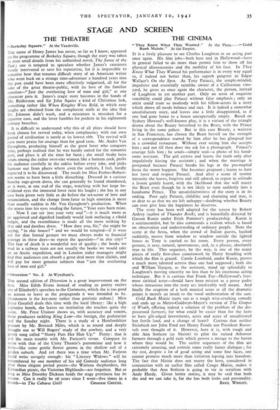STAGE AND SCREEN
THE THEATRE
4, Berkeley Square." At the Vaudeville.
THE name of Henry James has never, so far as I know, appeared on the programme of Berkeley Square, though the story was taken in even small details from his unfinished novel, The Sense of the Past; one is tempted to speculate whether James's executors wisely intervened to save his reputation, for it is impossible to conceive how that tenuous difficult story of an American writer who went back on a strange time-adventure a hundred years into the past could have been more effectively vulgarised, all for the sake of the great theatre-public, with its love of the familiar emotion—" Just the everlasting love of man and girl," as one character puts it. James's tragic story becomes in the hands of Mr. Balderston and Sir John Squire a kind of Christmas lark, something rather like When Knights Were Bold, in which easy laughs are obtained from the complacent stalls at the idea that Dr. Johnson didn't wash, and a miniature is mistaken for a cigarette case, and the lover fumbles for pockets in his eighteenth century breeches.
It is difficult to understand why this of all plays should have been chosen for revival today, when complacency with our own period of civilisation is surely at its lowest ebb. The revival will earn more praise for courage than for good taste. Mr. Andre Van Gyseghem, producing himself as the great lover who conquers time, perhaps realised that he was hardly suited for the romantic part, and plays it all the time for farce ; the small beaky hero struts among the rather over-size women like a bantam cock, pecks his audience carefully in the ankles before every joke, and picks humour out from places where even the authors, I feel, hardly expected it to be discovered. The result for Miss Forbes-Robert- son seems to have been a little disturbing. Dressed in a curious bunchy sage-green dress, she can generally be found abandoned, as it were, at one end of the stage, watching with her large be- wildered eyes the immortal lover raise his laughs ; she has in any case been given very little to do before the set-scene of love and renunciation, and the change from farce to high emotion is more than usually sudden in Mr. Van Gyseghem's production. When she stares into his eyes reading the future, "Your eyes burn mine. . . . Now I can see into your very soul "—it is much more as an aggrieved and dignified landlady would look outfacing a ribald lodger, and the resemblance is made all the more striking by that odd and dateless dress. " How dare you, Sir," she might be saying, " in this house? " and we would be tempted—if it were not for that formal gesture we must always make to financial courage in these days—to repeat the question—" in this city? " The fear of death is a wonderful test of quality ; the books we read in a railway train are not usually the books we would take on an Arctic expedition, and in London today managers might find that audiences can absorb a great deal more than clichés, and will pay for more genuine subjects than " just the everlasting love of man and girl."


























 Previous page
Previous page